The 1500s ran from January 1, 1500, to December 31, 1509.
| Millennium: | 2nd millennium |
| Centuries: |
|
| Decades: |
|
| Years: |
|
| Categories: |
|
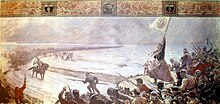
February 17, 1500: Battle of Hemmingstedt
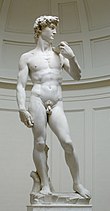
September 8, 1504: Michelangelo’s David is completed.
Events[edit]
1500
January–June[edit]
- January 5 – Duke Ludovico Sforza recaptures Milan, but is soon driven out again by the French.
- January 26 – Spanish navigator Vicente Yáñez Pinzón reaches the northern coast of Brazil.[1]
- February 17 – Battle of Hemmingstedt: The Danish army fails to conquer the peasants’ republic of Dithmarschen.
- April 22 – Portuguese navigator Pedro Álvares Cabral officially discovers Brazil, and claims the land for the Kingdom of Portugal. He had 13 vessels with him.
July–December[edit]
- July 14 – The Muscovites defeat the Lithuanians and the Poles in the Battle of Vedrosha.
- August – : The Turkish fleet of Kemal Reis defeats the Venetians in the Second Battle of Lepanto. The Turks proceed to capture Modon and Coron, the “two eyes of the Republic”.
- August 10 – Diogo Dias discovers an island which he names St Lawrence (after the saint’s day on which it was first sighted), later to be known as Madagascar.
- November 11 – Treaty of Granada: Louis XII of France and Ferdinand II of Aragon agree to divide the Kingdom of Naples between them.
- November 16 – Emperor Go-Kashiwabara accedes to the throne of Meiō era Japan.
- December 24 – The Siege of the Castle of St. George ends, and the island of Cephalonia is captured by a joint Venetian–Spanish fleet.
- December 31 – The last incunable is printed in Venice.[2]
Date unknown[edit]
- Europe’s population is estimated at 56.7 million people (Spielvogel).
- Heinrich Cornelius Agrippa is admitted to baccalaureate.
- Saxony’s mint at Annaberg begins producing guldengroschens.
- Although other reports exist, it is thought that the last wolf in England was killed this year, making the species extinct in that country. The wolf is thought to have been killed in Allithwaite, in Cumbria. However, reports of wolf sightings and laws concerning wolf bounties existed in rural areas of the north until the 18th century.
- A group of Māori migrated east from modern day New Zealand to the Rēkohu islands, developing a distinct pacificist culture known as the Moriori (approx date)
1501[edit]
January–June[edit]
- January 17 – Cesare Borgia returns triumphantly to Rome, from Romagna.
- March 25 – Portuguese navigator João da Nova probably discovers Ascension Island.[3] It is definitely sighted and named on May 20, 1503 (Feast of the Ascension) by Afonso de Albuquerque.[4]
- April – The Rebellion of the Alpujarras ends with the surrender of the last Muslim insurgents in the Alpujarra Mountains, who are given the choice of expulsion or conversion to Christianity.[5]
- May 15 – Harmonice Musices Odhecaton, the first printed collection of polyphonic music, is published by Ottaviano Petrucci in Venice.
July–December[edit]
- July – Ismail I is enthroned as Shah of Azerbaijan, choosing Tabriz as his capital, founding the Safavid Dynasty in northern Iran. He declares Shi’ism the official and compulsory religion, under penalty of death.
- July 21 – Portuguese explorer Pedro Cabral returns to Lisbon from his expedition to Calicut (Nicolau Coelho having arrived on June 23).
- July 27 – Copernicus is formally installed as canon of Frauenberg Cathedral.
- August
- John, King of Denmark, Norway and Sweden is deposed from the Swedish throne, starting the Dano-Swedish War (1501–1512).
- Florentine political theorist, statesman, and writer Niccolò Machiavelli marries Marietta Corsini, who will bear him six children.
- August 27 – Battle of the Siritsa River: The Livonian Order, supporting the Grand Duchy of Lithuania in the Second Muscovite–Lithuanian War, and commanded by Wolter von Plettenberg, defeats an army of the Grand Duchy of Moscow and Pskov Republic.
- October 13
- Treaty of Trente: Maximilian of Austria and Louis XII of France sign the treaty, with Austria recognizing all French conquests in the northern territories of Italy.
- Leonardo Loredan is elected 75th doge of the Venetian Republic.
- October 30 – The Banquet of Chestnuts is purportedly held by Cesare Borgia, in the Papal Palace of Rome (this account is not historical fact, and could be attributed to enemies of Alexander VI).
- November 1 (All Saints) – Amerigo Vespucci discovers and names Baía de Todos os Santos, in Brazil.
- November 4
- Battle of Mstislavl (Second Muscovite–Lithuanian War): Grand Prince Ivan’s Southern Muscovite army defeats the forces of the Grand Duchy of Lithuania.[6]
- Philip and Joanna of Castile leave for Spain.
- November 12 – Sten Sture the Elder is elected Regent of Sweden for the second time.
- November 14 – Arthur, Prince of Wales, marries the Spanish princess Catherine of Aragon.
- November 24 – A large army of the Grand Duchy of Moscow overruns Livonia during the Second Muscovite–Lithuanian War.[6]
- December 12 – Alexander Jagiellon becomes King of Poland.
- December 31 – First Battle of Cannanore: João da Nova fleet engaged the fleet of the Zamorin in a battle outside of the Cannanore harbor, the first Portuguese naval battle in the Indian Ocean.
Date unknown[edit]
- The Swiss cantons of Basel and Schaffhausen join the Old Swiss Confederacy.
- Gaspar Corte-Real, Portuguese navigator, makes the first documented European landing in North America since c. 1000 A.D.
- Rodrigo de Bastidas, sailing westward from Venezuela in search of gold, becomes the first European to explore the Isthmus of Panama.
- Amerigo Vespucci maps the two stars Alpha Centauri and Beta Centauri, as well as the stars of the constellation Crux, which are below the horizon in Europe.
- Dhaulpur is taken by Sikandar Lodi.
- Michelangelo returns to his native Florence, to begin work on the statue David.
- Italic type (cut by Francesco Griffo) is first used by Aldus Manutius at the Aldine Press in Venice, in an edition of Virgil.
- Martin Luther enters the University of Erfurt.
1502[edit]
January–June[edit]
- January 1 – Portuguese explorers, led by Gonçalo Coelho, sail into Guanabara Bay, Brazil, mistaking it for the mouth of a river, which they name Rio de Janeiro.
- February 12 – Isabella I issues an edict outlawing Islam in the Crown of Castile, forcing virtually all her Muslim subjects to convert to Christianity.
- May 3 – Portuguese navigator João da Nova discovers the uninhabited island of Saint Helena.[7]
- May 11 – Christopher Columbus leaves Cadiz, Spain for his fourth and final trip to the New World. He explores Central America, and discovers St. Lucia (possibly),[8] the Isthmus of Panama, Honduras, and Costa Rica.
July–December[edit]
- July – Ismail I becomes Shah of Persia.[9]
- August 14 – Christopher Columbus lands at Trujillo, and names the country ‘Honduras’.
- September – A Greek and Italian parallel text edition of Herodotus’ Histories, done for Count Matteo Maria Boiardo, is published in Venice by Aldus Manutius.
- September 18 – Christopher Columbus lands at Costa Rica.
- September 29; The Wedding of Vladislaus II of Bohemia and Hungary and Anne of Foix-Candale
- October 1 – An annular solar eclipse occurs.
- November 7 – Columbus reaches the coast of Honduras, and passes south to Panama.
- December 26 – Cesare Borgia kills Ramiro d’Orco; this incident is referenced in Machiavelli’s The Prince
- December 31 – Cesare Borgia (son of Pope Alexander VI) occupies Urbino, where he imprisons two potentially treacherous allies, Vitellozzo and Oliveretto; he executes them the next morning.
Date unknown[edit]
- The first African slaves brought to the New World arrive at the island of Hispaniola (modern-day Haiti and Dominican Republic).
- Bristol merchants return from Newfoundland (first so named this year from a letter) to England, carrying three native people and cod from the Grand Banks.[10][11]
- Moctezuma II is elected emperor of the Aztecs, following the death of Ahuitzotl.
- Meñli I Giray defeats the Golden Horde and sacks their capital, Sarai.
- Wittenberg University is founded.
- In Germany, Peter Henlein of Nuremberg uses iron parts and coiled springs to build a portable timepiece.
- In Italy, Asher Lämmlein declares that the Jewish Messiah will arrive in the next 6 months, resulting in the year of penance.
- The King’s School, Macclesfield, England, is founded by Sir John Percyvale.
- Heinrich Cornelius Agrippa receives the degree of magister artium from the University of Cologne.[12]
- Wilhelm Bombast moves to Villach with his son, Paracelsus.
1503[edit]

May 10: Columbus at Cayman Islands.
January–June[edit]
- January 20 – Seville in Castile is awarded exclusive rights to trade with the New World.
- January 24 – Construction of the Henry VII Chapel at Westminster Abbey begins in the perpendicular style, the final stage of English Gothic art.[13]
- February 11 – Queen Elizabeth of York, wife of Henry VII of England, dies on her 37th birthday, more than a week after giving birth to her daughter Katherine Tudor, who died the previous day.
- February 13 – Challenge of Barletta: Thirteen Italian knights defeat thirteen French knights, near Barletta.
- February 23 – French–Spanish Wars in Italy – Battle of Ruvo: The Spanish defeat the French.
- April 21 – Battle of Seminara: Spanish forces under Fernando de Andrade de las Mariñas defeat the French under Bernard Stewart, 4th Lord of Aubigny.
- April 21 – Battle of Cerignola: Spanish forces under Gonzalo Fernández de Córdoba defeat the French under Louis d’Armagnac, Duke of Nemours, who is killed (considered to be the first battle in history won by gunpowder small arms).
- May 10 – Christopher Columbus discovers the Cayman Islands, which he names Las Tortugas, after the numerous sea turtles there.
- May 13 – Naples is captured by the Spanish.
- May 20 (Feast of the Ascension) – Ascension Island is first definitively sighted, by Portuguese admiral Afonso de Albuquerque.[14]
- May 28 James IV of Scotland and Margaret Tudor are married as per the Treaty of Perpetual Peace by Pope Alexander VI, according to Papal bull.
July–December[edit]
- July 23 – Orbital calculations suggest that on this day, Pluto moves outside Neptune’s orbit, remaining there for 233 years.
- July 30 – Saint Helena is first definitively sighted, by ships of Portuguese navigator Estêvão da Gama returning from the East.[15][16][17]
- August 8 – King James IV of Scotland marries Margaret Tudor, daughter of King Henry VII of England, at Holyrood Abbey, Edinburgh, Scotland.
- August 20 – Stephen III of Moldavia concludes a treaty with Sultan Bayezid II, preserving Moldavia’s self-rule at the cost of an annual tribute to the Ottoman Empire.
- September 22 – Pope Pius III (Francesco Todeschini Piccolomini) succeeds Alexander VI as the 215th pope, but dies on October 18.[18]
- October 30 – Queen Isabella I of Spain prohibits violence against indigenous peoples in the New World.
- October 31 – Pope Julius II succeeds Pius III, as the 216th pope (some sources list November 1 as the date of election).
- December 29 – Battle of Garigliano, near Gaeta, Italy: Spanish forces under Gonzalo Fernández de Córdoba defeat a French–Italian mercenary army under Ludovico II, Marquess of Saluzzo; the French forces withdraw to Gaeta.
January-February
- Vasco da Gama establishes India’s first Portuguese fortress, at Cochin.
- Mariotto Albertinelli paints The Visitation.[19]
- Hieronymus Bosch works on the triptych The Garden of Earthly Delights.
- Leonardo da Vinci probably starts work on painting the Mona Lisa in Florence.
- The book The Imitation of Christ by Thomas à Kempis is re-published in an English translation.
- The pocket handkerchief comes into general use in polite European society.
- From this year until 1650, sixteen million kilograms of silver and 185,000 kilograms of gold will enter the port of Seville.
1504[edit]
January–June[edit]
- January 1 – French troops of King Louis XII surrender Gaeta to the Spanish, under Gonzalo Fernández de Córdoba.
- January 21 – After the death of Sten Sture the Elder on December 14 the year before, Svante Nilsson is elected the new Regent of Sweden.
- January 31 – Treaty of Lyon: France cedes Naples to Ferdinand II of Aragon, who becomes King of Naples as Ferdinand III.
- February 29 – Christopher Columbus uses his knowledge of a lunar eclipse this night, to convince the indigenous Jamaican people to provide him with supplies.
- April 1 – English guilds become subject to state control.
- April 23 – Maximilian I, Holy Roman Emperor, routes troops to Bavaria.
July–December[edit]
- September 8 – Michelangelo’s sculpture of David is completed in Florence.
- September 13 – Queen Isabella and King Ferdinand issue a Royal Warrant for the construction of Capilla Real, a Royal Chapel, to be built in Granada.
- September 22 – A settled engagement is arranged, between Karel of Luxembourg and Claudia the Beaujeu.
- September 22 – Treaty of Blois: Philip I of Castile, Maximilian I and Louis XII agree to terms.
- October 12 – Isabella I of Castile signs her will and testament.[20]
- November 7 – Christopher Columbus returns to Spain from his fourth voyage, during which he and his younger son, Ferdinand, explored the coast of Central America from Belizeto Panama.
- November 26 – On the death of Isabella I of Castile, Catholic Queen of Castile and Aragon, the Crown of Castile passes to her daughter Joanna.[21]
- December 8 (approximate date) – Islamic scholar Ahmad ibn Abi Jum’ah issues the Oran fatwa for Muslims in Spain (1 Rajab 910 AH in Hijri calendar, Gregorian date is approximate).
- December 24 – The Alvsson’s rebellion was crushed at Olsborg Castle in Båhuslen.
Date unknown[edit]
- Babur besieges and captures Kabul.
- Islamization of the Sudan region: A Funj leader, Amara Dunqas, founds the Sultanate of Sennar.
- Sheikh Ahmad, final leader of the Great Horde, is last heard of as a Lithuanian prisoner at Vilnius.
- Juan de la Cosa begins his first independent voyage, to the Isthmus of Panama.
- In Florence, Leonardo da Vinci and Niccolò Machiavelli become involved in a scheme to divert the Arno River, cutting the water supply to Pisa to force its surrender: Colombino, the project foreman, fails to follow da Vinci’s design, and the project is a major failure.
- Venetian ambassadors suggest to Turkey the construction of a Suez Canal.
- Aldus Manutius publishes his edition of Demosthenes in Venice.
- Matthias Grünewald paints a Crucifixion.
- The Signoria of Florence commissions both Leonardo da Vinci and Michelangelo to paint the walls of the Grand Council Chamber in the Palazzo Vecchio.
- Raphael paints The Marriage of the Virgin, which exemplifies some major principles of High Renaissance art.
1505[edit]
January–June[edit]
- June 6 – The M8.2–8.8 Lo Mustang earthquake strikes Nepal, causing severe damage in Kathmandu, western Nepal, and some parts of the Indo-Gangetic plain.[22]
- June 19 – Zhengde Emperor ascends the throne of Ming dynasty China.
- June 27 – The future King Henry VIII of England repudiates his engagement to Catherine of Aragon, at his father’s command.[23]
July–December[edit]
- July 2 – Martin Luther, aged 22, vows to become a monk in a moment of terror as a result of a close lightning strike during a thunderstorm, near the village of Stotternheim.[24]
- July – The Kalmar Bloodbath takes place in Kalmar, Sweden.
- July 17 – Luther enters the monastic life, at an Augustinian cloister in Erfurt.
- July 24 – Travelling to India, a group of Portuguese explorers sack the city-state of Kilwa in East Africa, killing the king for failing to pay tribute.
- November 6 – Vasili III succeeds Ivan III, as Grand Prince of Muscovy.
- December 30 – Érard de La Marck is elected prince-bishop of Liège.[25]
Date unknown[edit]
- A Portuguese fleet attacks Kilwa, and then Mombasa. The Portuguese then attempt to monopolize the trade in the east African ports, but are unable to maintain control (by the late 16th century, Swahili groups regain control of several ports from the Portuguese).
- Portuguese merchants establish factories on the east coast of Africa.
- Portuguese explorers under Dom Lourenço d’Almeida reach Colombo on Sri Lanka and send envoys to the King of Kotte; they also reach the Comoros.
- Bermuda is discovered by Spanish explorer Juan de Bermúdez.
- King Alexander of Poland signs the Nihil novi Act, making Poland a Nobles’ Democracy.
- Poland prohibits peasants from leaving their lands, establishing serfdom.
- Christ’s College, Cambridge, England, is re-founded, receiving its charter from Lady Margaret Beaufort.
- Judah Abravanel becomes personal physician to the viceroy of Naples.
- Battle of Achnashellach in Scotland: The Clan Cameron emerges victorious over several other clans.
- Watch 1505, the earliest known pocket watch, is made at Nuremberg, Germany by Peter Henlein.[26]
- 1505 (or 1506) – Portuguese explorer Gonçalo Álvares is the first to sight what will later be known as Gough Island in the South Atlantic.
1506[edit]
January–June[edit]
- January 14 – The classical statue of Laocoön and His Sons is unearthed in Rome. On the recommendation of Giuliano da Sangallo and Michelangelo, Pope Julius II purchases it, and places it on public display in the Vatican a month later.
- January 22 – The Swiss Guard arrives at the Vatican, to serve as permanent ceremonial and palace guards under Pope Julius II.
- April 18 – Pope Julius II lays the foundation stone of the new (current) St. Peter’s Basilica in Rome, replacing the Old St. Peter’s Basilica.
- April 19–21 – Lisbon Massacre: Thousands of Jews are tortured and killed by Catholics in Lisbon, Portugal.
July–December[edit]
- August 6 – Battle of Kletsk: The Grand Duchy of Lithuania defeats the Tatars of the Crimean Khanate.
- August 19 – Sigismund I the Old succeeds his brother, as king of Poland.[27]
- November 6 – Pope Julius II personally leads his troops into Bologna, retaking the city from the excommunicated tyrant Giovanni II Bentivoglio.
- September 2 – Yeonsangun of the Joseon dynasty is deposed in the Jungjong coup and King Jungjong ascends to the throne.
Date unknown[edit]
- The Portuguese mariner Tristão da Cunha sights the islands of Tristan da Cunha, naming them after himself.
- In Ming Dynasty China, the costs of the courier system are met by a tax in silver on land, instead of corvée labor service.
- Duarte Barbosa returns to Lisbon.
- Johannes Trithemius becomes abbot of the monastery of St. Jacob, at Würzburg.
- Leonardo da Vinci completes most of his work on the Mona Lisa.
1507[edit]
January–June[edit]
- April 25 – Martin Waldseemüller publishes his Cosmographiae Introductio (“Introduction to Universal Cosmography”) and accompanying wall map, the first to show the Americasas a separate continent, naming them in honour of Amerigo Vespucci, his friend and idol.
July–December[edit]
- July 4 – Martin Luther is ordained a priest of the Catholic Church.
- August 20 – Guru Nanak Dev becomes the first guru, and leader, of the Sikh religion.
- October – The Portuguese conquers the island of Ormuz in the Persian Gulf.
Date unknown[edit]
- The Timurid Dynasty ends, when Uzbeks under Muhammad Shaybani capture the capital, Herat, and Emir Badi’ al-Zaman Mirza flees.
- The Portuguese occupy Mozambique, and the islands of Socotra and Lamu.
- The Portuguese founded the town of Stone Town in Mozambique.
- Cardinal Cisneros is appointed major inquisitor of Castile.
- King Henry VII of England prosecutes lords for keeping private armies, which might threaten his régime.[28]
- King James IV grants a patent for the first printing press in Scotland, to Walter Chapman and Andrew Myllar.
- Raphael paints The Deposition, among other works.
- The Aztec New Fire ceremony is held for the last time (according to Bernardino de Sahagún).
1508[edit]
January–June[edit]
- February – Maximilian I, Holy Roman Emperor, attacks the Republic of Venice.
July–December[edit]
- August – Lebna Dengel succeeds his father Na’od, as Emperor of Ethiopia. Due to his young age, his grandmother Eleni acts as regent.
- December – Michelangelo begins painting the Sistine Chapel ceiling in the Holy See of Rome, on a commission by Pope Julius II (signed May 10).
- December 10 – The League of Cambrai is formed as an alliance against the Republic of Venice, between Pope Julius II, Louis XII of France, Maximilian I, Holy Roman Emperorand Ferdinand II of Aragon.
1509[edit]
January–June[edit]
- February 3 – Battle of Diu: The Portuguese defeat a coalition of Indians, Muslims and Italians.
- April 21 – Henry VIII becomes King of England (for 38 years) on the death of his father, Henry VII.[29]
- April 27 – Pope Julius II places Venice under interdict and excommunication,[30] for refusing to cede part of Romagna to papal control.
- May 14 – Battle of Agnadello: French forces defeat the Venetians.
- June 11
- Henry VIII of England marries Catherine of Aragon.
- Luca Pacioli’s De divina proportione, concerning the golden ratio, is published in Venice, with illustrations by Leonardo da Vinci.
- June 19 – Brasenose College, Oxford is founded by a lawyer, Sir Richard Sutton, of Prestbury, Cheshire, and the Bishop of Lincoln, William Smyth.
- June 24 – King Henry VIII of England and Queen Consort Catherine of Aragon are crowned.
July–December[edit]
- July 26 – Krishnadevaraya ascends the throne of the Vijayanagara Empire.
- September 10 – The Constantinople earthquake destroys 109 mosques and kills an estimated 10,000 people.
- September 11 – Portuguese fidalgo Diogo Lopes de Sequeira becomes the first European to reach Malacca, having crossed the Gulf of Bengal.
- November 4 – Afonso de Albuquerque becomes the governor of the Portuguese settlements in India.
Date unknown[edit]
- Erasmus writes his most famous work, In Praise of Folly.
- St Paul’s School, London is founded by John Colet, Dean of St Paul’s Cathedral.
- Royal Grammar School, Guildford, England, is founded under the will of Robert Beckingham.
- Queen Elizabeth’s Grammar School, Blackburn, England, is founded as a grammar school for boys.
- Basil Solomon becomes Syriac Orthodox Maphrian of the East.[31]
Births[edit]
1500
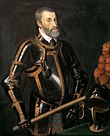
Emperor Charles V
- January 1 – Solomon Molcho, Portuguese mystic (d. 1532)
- January 6 – John of Ávila, Spanish mystic and saint (d. 1569)
- January 20 – Jean Quintin, French priest, knight and writer (d. 1561)[32]
- February 7 – João de Castro, Portuguese nobleman and fourth viceroy of Portuguese India (d. 1548)
- February 22 – Cardinal Rodolfo Pio da Carpi, Italian humanist (d. 1564)
- February 24 – Charles V, Holy Roman Emperor (d. 1558)[33]
- March 12 – Reginald Pole, Archbishop of Canterbury (d. 1558)
- April 12 – Joachim Camerarius, German classical scholar (d. 1574)[34]
- April 23
- Alexander Ales, Scottish theologian (d. 1565)[35]
- Johann Stumpf, Swiss writer (d. 1576)[36]
- April 27 – Louis, Count of Vaudémont, Italian bishop (d. 1528)
- May 17 – Federico II Gonzaga, Duke of Mantua (d. 1540)
- June 13 – Ernest of Bavaria, pledge lord of the County of Glatz (d. 1560)
- July 2 – Federico Cesi (cardinal), Italian cardinal (d. 1565)
- July 20 – Lorenzo Cybo, Italian condottiero (d. 1549)
- August 16 – Louis Gonzaga (Rodomonte), Italian-French dignitary and diplomat (d. 1532)
- September 5 – Maria of Jever, last ruler of the Lordship of Jever (d. 1575)
- September 7 – Sebastian Newdigate, Carthusian monk and martyr (d. 1535)
- September 17 – Sebastiano Antonio Pighini, Italian cardinal (d. 1553)
- September 26 – Ludovica Torelli, Count of Guastalla (d. 1569)
- October 17 – Alonso de Orozco Mena, Spanish Roman Catholic priest (d. 1591)
- November 3 – Benvenuto Cellini, Italian goldsmith and sculptor (d. 1571)
- December 6 – Nicolaus Mameranus, Luxembourgian soldier and historian (d. 1567)
- probable
- Johannes Aal, Swiss theologian and composer (d. 1553)
- Charles Dumoulin, French jurist (d. 1566)
- Wu Cheng’en, Chinese novelist (d. 1582)
- Heinrich Faber, German music theorist (d. 1552)
- Francisco de Moraes, Portuguese writer (d. 1572)
- Mem de Sá, Governor-General of Brazil (d. 1572)
- Jeanne de la Font, French poet and culture patron (d. 1532)
1501
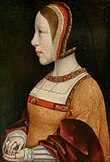
Isabella of Burgundy

Gerolamo Cardano
- January 16 – Anthony Denny, confidant of Henry VIII of England (d. 1559)
- January 17 – Leonhart Fuchs, German physician and botanist (d. 1566)
- January 24 – Jacob Milich, German astronomer and mathematician (d. 1559)
- February 24 – Sixt Birck, German humanist (d. 1554)
- March 21 – Anne Brooke, Baroness Cobham, English noble (d. 1558)
- March 12 – Pietro Andrea Mattioli, Italian scientist (d. 1577)
- May 6 – Pope Marcellus II (d. 1555)
- May 17 – Stanisław of Masovia, Polish duke (d. 1524)
- July 10 – Cho Shik, Korean Confucian scholar and politician (d. 1572)
- July 18 – Isabella of Burgundy, queen of Christian II of Denmark (d. 1526)
- August 17 – Philipp II, Count of Hanau-Münzenberg (d. 1529)
- September 18 – Henry Stafford, 1st Baron Stafford, English baron (d. 1563)
- September 24 – Gerolamo Cardano, Italian mathematician, physician, astrologer and gambler (d. 1576)
- September 26 – Gian Gabriele I of Saluzzo, Italian abbot, Marquess of Saluzzo (d. 1548)
- November 14 – Anna of Oldenburg, Regent of East Frisia from 1540 to 1561 (d. 1575)
- December 2 – Queen Munjeong, Korean queen (d. 1565)
- date unknown
- Yi Hwang, Korean Confucian scholar (d. 1570)
- Girolamo da Carpi, Italian painter (d. 1556)
- Dawit II of Ethiopia (d. 1540)
- Bauck Poppema, Dutch noble and heroine
- Anne Boleyn, second queen of Henry VIII of England (b. this year or 1507; d. 1536)
- Murakami Yoshikiyo, Japanese nobleman (d. 1573)
- probable
- Nicholas Heath, archbishop of York and Lord Chancellor (d. 1578)
- Garcia de Orta, Portuguese physician (d. 1568)
- Hilaire Penet, French composer
1502
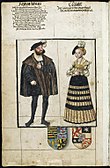
Elisabeth of Hesse, Hereditary Princess of Saxony
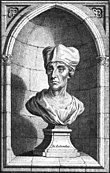
John Leland
- January 7 – Pope Gregory XIII, born Ugo Boncompagni, Bolognese-born pontiff (d. 1585)
- January 20 – Sebastian de Aparicio, Spanish colonial industrialist and saint in Mexico (d. 1600)
- February 2 – Damião de Góis, Portuguese philosopher (d. 1574)
- March 4 – Elisabeth of Hesse, Hereditary Princess of Saxony (d. 1557)
- March 18 – Philibert of Chalon, French nobleman (d. 1530)
- March 20 – Pierino Belli, Italian soldier and jurist (d. 1575)
- April 2 – Susanna of Bavaria, German noble of the House of Wittelsbach (d. 1543)
- April 10 – Otto Henry, Count Palatine of Neuburg (1505–1559) and Elector Palatine (1556–1559) (d. 1559)
- April 25 – Georg Major, German Lutheran theologian (d. 1574)
- June 2 – Guillaume Bigot, French writer (d. 1550)
- June 7 – King John III of Portugal (d. 1557)
- July 26 – Christian Egenolff, German printer (d. 1555)
- July 27 – Francesco Corteccia, Italian composer (d. 1571)
- August 14 – Pieter Coecke van Aelst, Flemish painter (d. 1550)
- September 14 – Louis II, Count Palatine of Zweibrücken, Duke of Zweibrücken from 1514 to 1532 (d. 1532)
- December 6 – Anna of Brunswick-Lüneburg, Duchess consort of Pomerania (d. 1568)
- December 13 – George III, Landgrave of Leuchtenberg (d. 1555)
- date unknown
- Takeno Jōō, Japanese Sengoku period master of the tea ceremony and merchant (d. 1555)
- Miguel López de Legazpi, Spanish conquistador (d. 1572)
- Pedro Nunes, Portuguese mathematician (d. 1578)
- Francesco Spiera, Italian Protestant jurist (d. 1543)
- Anthony Maria Zaccaria, Cremonese founder of the Barnabite Order and saint (d. 1539)
- probable
- Elizabeth Blount, English courtier, mistress of King Henry VIII of England (d. 1540)
- Cuauhtémoc, last Aztec ruler (Tlatoani) of Tenochtitlán and the last “Aztec Emperor” (d. 1525)
- Blaise de Lasseran-Massencôme, seigneur de Montluc, marshal of France (approximate date; d. 1577)
- Hurrem Sultan, Ruthenian-born Haseki sultan of the Ottoman Empire (d. 1558)
- Henry Percy, 6th Earl of Northumberland, English courtier (d. 1537)
1503

Queen Anne of Bohemia and Hungary

Queen Isabella of Portugal
- January 3 – Al-Mutahhar, Imam of the Zaidi state of Yemen (d. 1572)
- January 11 – Parmigianino (Girolamo Francesco Maria Mazzola), Italian artist (d. 1540)
- January 18 – Joachim of Münsterberg-Oels, Duke of Münsterberg, Duke of Oels, Count of Kladsko, Bishop of Brandenburg (d. 1562)
- February 24 – Johann Gropper, German Catholic cardinal (d. 1559)
- March 4 – Elisabeth of Hesse, Countess Palatine of Zweibrücken, later Countess Palatine of Simmern (d. 1563)
- March 10 – Ferdinand I, Holy Roman Emperor (d. 1564)[37]
- March 11 – George Harper, English politician (d. 1558)
- March 22 – Antonio Francesco Grazzini, Italian writer (d. 1584)
- April 6 – Jacob Micyllus, German humanist (d. 1558)
- April 18 – Henry II of Navarre, King of Navarre (1517–1555) (d. 1555)
- May 1 – Celio Secondo Curione, Italian humanist (d. 1569)
- June 1 – Wilhelm von Grumbach, German adventurer (d. 1567)
- June 28 – Giovanni della Casa, Italian poet (d. 1556)
- June 30 – John Frederick I, Elector of Saxony (d. 1554)
- July 23 – Anne of Bohemia and Hungary, Queen consort of the Romans, Bohemia and Hungary (d. 1547)
- August 12 – Christian III of Denmark and Norway (d. 1559)
- October 4 – Isabella of Portugal, Queen of Spain (d. 1539)[38]
- November 12 – Philip, Duke of Palatinate-Neuburg, German duke (d. 1548)
- November 13 – Ippolita Gonzaga, Italian nun (d. 1570)
- November 17 – Agnolo di Cosimo, Italian artist and poet (d. 1572)
- November 19 – Pier Luigi Farnese, Duke of Parma (d. 1547)
- December 14 – Michel de Nostredame, called Nostradamus, French physician and writer of Les Propheties (1555) (d. 1566)
- December 20 – Cosimo Bartoli, Italian diplomat and writer (d. 1572)
- date unknown
- Lucas David, Prussian historian (d. 1583)
- Robert Estienne, French printer (d. 1559)
- John Frith, English Protestant priest and martyr (d. 1533)
- Susannah Hornebolt, English artist (d. c. 1554)
- Lakandula, Lakan of Tondo (d. 1589)
- Shimazu Katsuhisa, Japanese nobleman (d. 1573)
- Tomé de Sousa, Portuguese nobleman, first general-governor of Brazil (d.1573 or 1579)
- probable – Nicholas Bourbon, French poet
1504

Anna II, Princess-Abbess of Quedlinburg

Dorothea of Denmark, Duchess of Prussia

Beatrice of Portugal, Duchess of Savoy
- January 1 – Caspar Creuziger, German humanist (d. 1548)[39]
- January 17 – Pope Pius V (d. 1572)[40]
- January 28 – Anna II, Princess-Abbess of Quedlinburg, German noblewoman, reigning from 1516 until her death (d. 1574)
- February 3 – Scipione Rebiba, Italian cardinal (d. 1577)
- March 31 – Guru Angad, Indian religious leader (d. 1552)
- April 12 – Alessandro Campeggio, Italian cardinal (d. 1554)[41]
- April 30 – Francesco Primaticcio, Italian painter (d. 1570)[42]
- May 5 – Stanislaus Hosius, Polish cardinal (d. 1579)
- May 29 – Antun Vrančić, Croatian archbishop (d. 1573)
- June 24 – Johannes Mathesius, German theologian (d. 1565)
- July 18 – Heinrich Bullinger, Swiss religious reformer (d. 1575)
- August 1 – Dorothea of Denmark, Duchess of Prussia, Danish princess (d. 1547)
- August 6 – Matthew Parker, English Archbishop of Canterbury (d. 1574)
- September 4 – John V, Prince of Anhalt-Zerbst, Prince of Anahlt-Dessau (1516–1544) and Anhalt-Zerbst (1544–1551) (d. 1551)
- September 20 – Philip III, Count of Nassau-Weilburg (d. 1559)
- October 29 – Shin Saimdang, Korean calligraphist and noted poet (d. 1551)
- November – Giovanni Battista Giraldi, Italian novelist and poet (d. 1573)
- November 13 – Philip I, Landgrave of Hesse (d. 1567)
- December – Nicholas Udall, English playwright and schoolmaster (d. 1556)[43]
- December 31 – Beatrice of Portugal, Duchess of Savoy (d. 1538)
- date unknown
- Ali ibn Ahmad al-Samhudi (علي بن أحمد السمهودي), Egyptian Sunni Islamic scholar, author of Wafa al-Wafa bi akhbar Dar al-Mustafa
- John Dudley, 1st Duke of Northumberland, English Tudor nobleman and politician (executed 1553)[44]
- Patrick Hamilton, Scottish churchman and Reformer (burned at the stake 1528)
- Dirk Philips, early Dutch Anabaptist writer and theologian (d. 1568)
1505
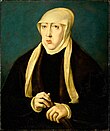
Mary of Hungary
- January 12 – Louis, Count of Stolberg, German nobleman (d. 1574)
- January 13 – Joachim II Hector, Elector of Brandenburg, Imperial Elector (d. 1571)
- February 4 – Mikołaj Rej, Polish poet and prose writer, politician and musician of the Renaissance (d. 1569)[45]
- February 5 – Aegidius Tschudi, Swiss historian (d. 1572)
- March 16 – Francisco Balbi di Correggio (d. 1589)[46]
- March 25 – Elizabeth Grey, Viscountess Lisle, English heiress (d. 1519)
- May 20 – Levinus Lemnius, Dutch writer (d. 1568)
- September 15 – Mary of Hungary, Dutch ruler (d. 1558)
- September 23 – Anne de Laval, Viscountess of Thouars, French noblewoman and nominal pretender to the Kingdom of Naples (d. 1554)
- November 3 – Achilles Gasser, German physician and astrologer (d. 1577)
- November 23 – Ercole Gonzaga, Spanish Catholic cardinal (d. 1563)
- December 18 – Philipp von Hutten, German explorer (d. 1546)
- December 21 – Thomas Wriothesley, 1st Earl of Southampton, English politician (d. 1550)[47]
- December 25 – Christine of Saxony, German noble (d. 1549)
- date unknown
- William Cavendish, English courtier (d. 1557)
- Philip Hoby, English politician (d. 1558)
- Guillaume Morel, French classical scholar (d. 1564)
- Margaret Roper, English writer (d. 1544)
- Shahghali, Khan of Qasim
- probable – Christopher Tye, English composer and organist (d. 1572)[48]
1506
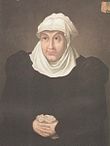
Juliana of Stolberg
- February – George Buchanan, Scottish humanist scholar (d. 1582)
- February 2 – René de Birague, French cardinal and chancellor (d. 1583)
- February 15 – Juliana of Stolberg, German countess (d. 1580)
- March 3 – Luís of Portugal, Duke of Beja (d. 1555)
- April 7 – Francis Xavier, Spanish Jesuit saint (d. 1552)
- April 13 – Peter Faber, French Jesuit theologian (d. 1546)
- July 1 – Louis II of Hungary and Bohemia (d. 1526)
- August 12 – Franciscus Sonnius, Dutch counter-Reformation theologian (d. 1576)
- October – Louis de Blois, Flemish mystical writer (d. 1566)
- December 4 – Thomas Darcy, 1st Baron Darcy of Chiche, English courtier (d. 1558)
- December 8 – Veit Dietrich, German theologian, writer and reformer (d. 1549)
- date unknown
- Vicente Masip, Spanish painter (d. 1579)
- William Paget, 1st Baron Paget, English statesman (d. 1563)
- Ii Naomori, Japanese samurai (d. 1560)
- probable
- Elizabeth Barton, English nun (d. 1534)
- Margaret Lee, confidante of Queen Anne Boleyn (d. 1543)
1507

Anna of Brandenburg, Duchess of Mecklenburg
- January 1 – Anna of Brandenburg, Duchess of Mecklenburg-Güstrow (d. 1567)
- January 14
- Catherine of Austria, Queen of Portugal (d. 1578)
- Luca Longhi, Italian painter (d. 1580)
- January 18 – Ferdinando Sanseverino, Prince of Salerno (d. 1572)
- January 25 – Johannes Oporinus, Swiss printer (d. 1568)
- February 11 – Philip II, Metropolitan of Moscow, Russian Orthodox monk (d. 1569)
- February 21 – James, Duke of Rothesay, Scottish prince (d. 1508)
- March 7 – Magdalena of Saxony (d. 1534)
- March 25 – Thomas White, English politician (d. 1566)
- March 29 – Henry II, Duke of Münsterberg-Oels and Count of Glatz (d. 1548)
- April 13 – Konrad Hubert, German theologian and hymnwriter (d. 1577)
- June 5 – Ferdinand of Portugal, Duke of Guarda and Trancoso, Portuguese nobleman (d. 1534)
- June 6 – Annibale Caro, Italian poet and Knight of Malta (d. 1566)
- June 25 – Marie of Baden-Sponheim, duchess consort of Bavaria (d. 1580)
- July 25 – Chamaraja Wodeyar IV, King of Mysore (d. 1576)
- August 2 – William Waldegrave, English Member of Parliament (d. 1554)
- August 15 – George III, Prince of Anhalt-Dessau, German prince (d. 1553)
- September 16 – Jiajing Emperor of China (d. 1567)
- September 27 – Guillaume Rondelet, French physician (d. 1566)
- October 1
- Johannes Sturm, German educator (d. 1589)
- Giacomo Barozzi da Vignola, Italian architect (d. 1573)
- October 4 – Francis Bigod, British noble (d. 1537)
- October 19 – Viglius, Dutch politician (d. 1577)
- October 26 – Alvise I Mocenigo, Doge of Venice (d. 1577)
- October 29 – Fernando Alvarez de Toledo, Spanish general (d. 1582)
- November 25 – Joos de Damhouder, Belgian jurist (d. 1581)
- December 18 – Ōuchi Yoshitaka, Japanese warlord (d. 1551)
- date unknown
- Bálint Bakfark, Hungarian composer (d. 1576)
- Sir Ralph Sadler, English statesman (d. 1587)
- probable
- Jacques Arcadelt, Franco-Flemish composer (d. 1568)
- Inés Suárez, Spanish conquistadora (d. 1580)
- possible
- Anne Boleyn, second queen of Henry VIII of England (b. this year or 1501; d. 1536)
1508

Andrea Palladio
- February 17 – Bernardo Salviati, Italian Catholic cardinal (d. 1568)
- April 3 – Jean Daurat, French writer and scholar (d. 1588)
- April 5 – Ercole II d’Este, Duke of Ferrara, Italian noble (d. 1559)
- April 23 – Georg Sabinus, German writer (d. 1560)
- May 8 – Charles Wriothesley, English Officer of Arms (d. 1562)
- June 8 – Primož Trubar, Slovenian Protestant reformer who lays the foundations for the Slovenian written language (d. 1586)
- June 10 – Hedwig of Münsterberg-Oels, German noble (d. 1531)
- June 13 – Alessandro Piccolomini, Italian humanist and philosopher from Siena (d. 1579)
- June 29 – Balthasar of Hanau-Münzenberg, German nobleman (d. 1534)
- September 19 – Maria Paleologa, Italian noblewoman (d. 1530)
- September 23 – Simon Sulzer, Swiss theologian (d. 1585)
- September 25 – Francisco Mendoza de Bobadilla, Spanish Catholic cardinal (d. 1566)
- November 23 – Francis, Duke of Brunswick-Lüneburg, youngest son of Henry the Middle (d. 1549)
- November 25 – Cristofano Gherardi, Italian painter (d. 1556)
- November 30 – Andrea Palladio, Italian architect (d. 1580)
- December 9 – Gemma Frisius, Dutch mathematician and cartographer (d. 1555)
- December 21 – Thomas Naogeorgus, German playwright (d. 1563)
- December 24 – Pietro Carnesecchi, Italian humanist (d. 1567)
- date unknown
- Livio Agresti, Italian painter (d. 1580)
- Matsunaga Hisahide, Japanese daimyo (d. 1577)
- Marin Držić, Croatian playwright (d. 1567)
- possible
- Isabel de Josa, Catalan writer (d. 1575)
- Jane Seymour, third queen of Henry VIII of England (d. 1537)
1509

John of Leiden
- January 1 – Guillaume Le Testu, French privateer (d. 1573)
- January 2 – Henry of Stolberg, German nobleman (d. 1572)
- January 3 – Gian Girolamo Albani, Italian Catholic cardinal (d. 1591)
- January 25 – Giovanni Morone, Italian Catholic cardinal (d. 1580)
- February 2 – John of Leiden, Dutch Anabaptist leader (d. 1536)
- February 10 – Vidus Vidius, Italian surgeon and anatomist (d. 1569)
- March 27 – Wolrad II, Count of Waldeck (1539–1575) (d. 1575)
- April 23 – Afonso of Portugal, Roman Catholic cardinal (d. 1540)
- July 4 – Magnus III of Mecklenburg-Schwerin, Lutheran bishop of the Prince-Bishopric of Schwerin (d. 1550)
- July 10 – John Calvin, French religious reformer (d. 1564)
- July 25 – Philip II, Count of Nassau-Saarbrücken, German noble (d. 1554)
- August 3 – Étienne Dolet, French scholar and printer (d. 1546)
- August 7 – Joachim I, Prince of Anhalt-Dessau, German prince (d. 1561)
- August 25 – Ippolito II d’Este, Italian cardinal and statesman (d. 1572)
- October 20 – Arthur Stewart, Duke of Rothesay, Scottish prince (d. 1510)
- November 4 – John, Duke of Münsterberg-Oels and Count of Glatz (d. 1565)
- date unknown
- John Erskine of Dun, Scottish religious reformer (d. 1591)
- Stanisław Odrowąż, Polish noble (d. 1545)
- Anneke Esaiasdochter, Dutch Anabaptist (d. 1539)
- Gonzalo Jiménez de Quesada, Spanish conquistador (d. 1579)
- Bernardino Telesio, Italian philosopher and natural scientist (d. 1588)
- Kamran Mirza, Mughal prince (d. 1557)
Deaths[edit]
1500
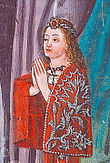
Leonhard of Gorizia

Alfonso of Aragon
- February 17 – William III, Landgrave of Hesse (b. 1471)
- April 10 – Michael Tarchaniota Marullus, Greek scholar, poet and soldier (b. c. 1453)[49]
- April 12 – Leonhard of Gorizia, Count of Gorz (b. 1440)
- May 29
- Bartolomeu Dias, Portuguese explorer (b. c. 1450)
- Thomas Rotherham, English cleric and minister (b. 1423)
- June 19 – Edmund Tudor, Duke of Somerset, English nobleman (b. 1499)
- June 23 – Lodovico Lazzarelli, Italian poet (b. 1447)[50]
- July 14 – Íñigo López de Mendoza y Luna, 2nd Duke of the Infantado, Spanish noble (b. 1438)
- July 19 – Miguel da Paz, Prince of Portugal (b. 1498)
- August 18 – Alfonso of Aragon, prince (b. 1481)
- August 26 – Philipp I, Count of Hanau-Münzenberg, German noble (b. 1449)
- August 30 – Victor, Duke of Münsterberg and Opava, Count of Glatz (b. 1443)
- September 12 – Albert III, Duke of Saxony (b. 1443)
- September 15 – John Morton, English Archbishop of Canterbury (b. c. 1420)[51]
- October 1 – John Alcock, English Bishop of Ely (b. c. 1430)
- October 21 – Emperor Go-Tsuchimikado of Japan (b. 1442)
- November 13 – Philip, Prince of Anhalt-Köthen, German prince (b. 1468)
- date unknown – Antonia of Savoy, Lady Consort of Monaco
- Probable
- Juan Pérez de Gijón, Spanish composer (b. 1460)
- Stefano Infessura, Italian humanist writer (b. c. 1435)
- Fyodor Kuritsyn, Russian statesman, philosopher and poet
1501

Blessed Columba of Rieti

John I Albert
- January 3 – Ali-Shir Nava’i, Central Asian poet, politician and writer (b. 1441)
- January 5 – John Dynham, 1st Baron Dynham, English baron and Lord High Treasurer (b. 1433)
- January 25 – Margaret of Bavaria, Electress Palatine, Princess of Bavaria-Landshut (b. 1456)
- February 1 – Sigismund, Duke of Bavaria, German noble (b. 1439)
- March 4 – Thihathura II of Ava (b. 1474)
- April – John Doget, English diplomat
- April 7 – Minkhaung II, king of Ava (b. 1446)
- April 23 – Domenico della Rovere, Italian Catholic cardinal (b. 1442)
- May 3 – John Devereux, 9th Baron Ferrers of Chartley, English baron (b. 1463)
- May 7 – Giovanni Battista Zeno, Italian Catholic cardinal
- May 20 – Columba of Rieti, Italian Dominican tertiary Religious Sister and blessed (b. 1467)
- June 8 – George Gordon, 2nd Earl of Huntly, Earl of Huntly and Lord Chancellor of Scotland (b. 1440)
- June 17 – John I Albert of Poland (b. 1459)

Agostino Barbarigo
- August 15 – Constantine Lascaris, Greek scholar and grammarian
- September 20
- Agostino Barbarigo, Doge of Venice
- Thomas Grey, 1st Marquess of Dorset, stepson of Edward IV of England (b. 1457)
- September 26 – Džore Držić, Croatian poet and playwright (b. 1461)
- September 29 – Andrew Stewart, Scottish bishop (b. 1442)
- November 19 – Amalia of Saxony, Duchess of Bavaria-Landshut (b. 1436)
- probable – Gaspar Corte-Real, Portuguese explorer (b. 1450)
1502
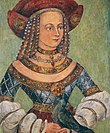
Hedwig Jagiellon, Duchess of Bavaria
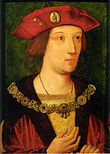
Arthur, Prince of Wales
- February 18 – Hedwig Jagiellon, Duchess of Bavaria (b. 1457)
- March – Francesco Laurana, Dalmatian-born sculptor (b. c. 1430)
- March 2 – Jan I Carondelet, Burgundian jurist and politician (b. 1428)
- April 2 – Arthur, Prince of Wales, English prince, eldest son of Henry VII of England (b. 1486)
- April 15 – John IV of Chalon-Arlay, Prince of Orange (1475–1502) (b. 1443)
- April 20 – Maria of Loon-Heinsberg, Dutch noble (b. 1426)
- May 4 – Berthold II of Landsberg, Bishop of Verden (1470–1502) and Hildesheim (1481–1502) (b. 1464)
- May 6 – James Tyrrell, English knight, alleged murderer of the princes in the Tower (executed) (b. c. 1450)
- June 9 – Astorre III Manfredi, Italian noble (b. 1485)
- July 15 – Luka Radovanović, Catholic priest (b. 1425)
- August 18 – Knut Alvsson, Norwegian nobleman and politician (b. 1455)
- August 31 – Thomas Wode, Lord Chief Justice of the Common Pleas
- September 1 – Sōgi, Japanese Buddhist priest and poet (b. 1421)
- October 14 – Diego Hurtado de Mendoza y Quiñones, Spanish noble (b. 1444)
- November 10 – George I of Münsterberg, Imperial Prince, Duke of Münsterberg and Oels, Graf von Glatz (b. 1470)
- November 13 – Annio da Viterbo, Italian Dominican friar and scholar (b. 1432)
- December 31
- Oliverotto Euffreducci, Italian politician (b. 1475)
- Vitellozzo Vitelli, Italian condottiero (b. c. 1458)
- date unknown
- Ahuitzotl, Aztec ruler of Tenochtitlan
- Octavien de Saint-Gelais, French churchman, poet and translator (b. 1468)
- Gwerful Mechain, Welsh erotic poet (b. c. 1460?)
1503

Pope Alexander VI

Peter II, Duke of Bourbon
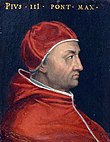
Pope Pius III
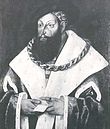
George, Duke of Bavaria
- January 20 – Ludmila of Poděbrady, Regent of the duchies of Brzeg and Oława (1488–1503) (b. 1456)
- February 11 – Elizabeth of York, queen of Henry VII of England (b. 1466)[52]
- March 16 – Edward Story, Bishop of Carlisle and Chichester
- March 14 – Frederick Jagiellon, Primate of Poland (b. 1468)
- April 4 – Annamacharya, Indian mystic saint composer (b. 1408)
- April 7 – Sophia Palaiologina, Byzantine princess and Grand Princess of Moscow (b. 1449)
- May 20 – Lorenzo di Pierfrancesco de’ Medici, Italian patron of the arts (b. 1463)
- June 2 – Clara Gonzaga, Italian noble (b. 1464)
- June 24 – Reginald Bray, British courtier (b. 1440)
- July 3 – Pierre d’Aubusson, Grand Master of the Knights of Rhodes (b. 1423)
- July 12 – Sophie of Mecklenburg, Duchess of Mecklenburg, Duchess of Saxony (b. 1481)
- July 24 – Louise of Savoy, Nun (b. 1461)
- August 12 – Anna Jagiellon, Duchess of Pomerania, Polish princess (b. 1476)
- August 18 – Pope Alexander VI (b. 1431)[53]
- September 5 – Margaret of Hanau-Münzenberg, German noblewoman (b. 1471)
- October 10 – Peter II, Duke of Bourbon (b. 1438)
- October 18 – Pope Pius III (b. c. 1439)[54]
- November 23
- Bona of Savoy, Duchess of Savoy (b. 1449)
- Margaret of York, Duchess consort of Burgundy, spouse of Charles I, Duke of Burgundy (b. 1446)
- December 1 – George, Duke of Bavaria (b. 1455)
- December 14 – Sten Sture the Elder, regent of Sweden (1470–1497 and 1501–1503) (b. 1440)
- December 28 – Piero di Lorenzo de’ Medici, exiled ruler of Florence (drowned) (b. 1472)
- date unknown
- Richard Amerike, English merchant and patron of John Cabot (b. 1445)
- Anacaona, Taino queen and poet (b. 1474)
1504

Isabella I of Castile
- January 9 – Gaspare Nadi, Italian builder (b. 1418)
- January 27 – Ludovico II, Marquess of Saluzzo (b. 1438)
- February 17 – Eberhard II, Duke of Württemberg (b. 1447)
- April 15 – Filippino Lippi, Italian painter (b. 1457)[55]
- May 31 – Engelbert II of Nassau (b. 1451)
- June – Lê Hiến Tông, Emperor of the Lê Dynasty
- June 19 – Bernhard Walther, German astronomer and humanist (b. 1430)
- July 2 – Stephen the Great, Prince of Moldova (b. 1434)
- July 29 – Thomas Stanley, 1st Earl of Derby (b. 1435)
- August – Domenico Maria Novara da Ferrara, Italian astronomer (b. 1454)
- August 20 – Ruprecht of the Palatinate (Bishop of Freising) (b. 1481)
- August 22 – Philipp II, Count of Hanau-Lichtenberg (1489–1503) (b. 1462)
- August 28 – John Paston, English gentleman known from the Paston Letters (b. 1444)[56]
- September 10 – Philibert II, Duke of Savoy (b. 1480)
- September 15 – Elisabeth of Bavaria (b. 1478)
- September 22 – Jan II the Mad, Duke of Żagań (1439–1449 and 1461–1468 and again in 1472) (b. 1435)
- September 24 – Bartolomeo della Rocca (“Cocles”), Italian astrologer (b. 1467)[57]
- October 12 – John Corvinus, Hungarian noble (b. 1473)[58]
- November 9 – King Frederick IV of Naples (b. 1452)
- November 26 – Queen Isabella I of Castile (b. 1451)[21]
- December – Lê Túc Tông, Emperor of the Lê Dynasty
- December 21 – Berthold von Henneberg, German archbishop and elector (b. 1442)
- date unknown
- Abdal-Karim Khan Astrakhani, Khan of Astrakhan
- Abu Abdallah IV, Sultan of Tlemcen
- Abu Abd Allah al-Sheikh Muhammad ibn Yahya, first Wattasid Sultan of Morocco and King of Fez
- Éamonn Mág Samhradháin, Lord of Tullyhaw
- Fathullah Imad-ul-Mulk, Indian-born founder of the Berar Sultanate
- Garci Rodríguez de Montalvo, Spanish author
- Qasim Barid I, founder of the Bidar Sultanate
- Vira Ravi Ravi Varma, Raja of Venad
- Choe Bu, Korean official and venturer to China (b. 1454)
1505

Saint Jeanne de Valois

Emperor Hongzhi
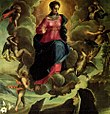
Blessed Osanna of Mantua

Ivan III of Russia
- February 4 – Jeanne de Valois, French princess, Roman Catholic nun and saint (b. 1464)[59]
- February 19 – Matilda of Hesse, German noblewoman (b. 1473)
- February 20 – Arvid Trolle, Swedish politician (b. 1440)
- March 5 – Philip of Cleves, Bishop of Nevers, Amiens, Autun (b. 1467)
- March 29 – Sidonie of Bavaria, eldest daughter of Duke Albrecht IV of Bavaria-Munich (b. 1488)
- April 23 – Muhammad Jaunpuri, Indian-born religious leader (b. 1443)
- May 28 – Ascanio Sforza, Italian Roman Catholic cardinal (b. 1455)[60]
- June 8 – Hongzhi Emperor of China (b. 1470)
- June 18 – Osanna of Mantua, Italian Dominican tertiary and blessed (b. 1449)
- June 15 – Ercole I d’Este, Duke of Ferrara, Italian politician (b. 1431)
- July – Jacob Obrecht, Flemish composer (plague) (b. 1457)[61]
- October 27 – Emperor Ivan III of Russia (b. 1440)
- date unknown
- Adam of Fulda, German music writer (b. c. 1445)[62]
- Heinrich Kramer, German churchman and inquisitor (b. 1430)
1506
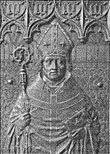
Johann IV Roth

Christopher Columbus
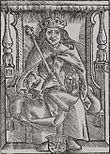
King Alexander Jagiellon of Poland

King Philip of Castile
- January 21 – Johann IV Roth, German Roman Catholic bishop (b. 1426)
- May 4 – Sultan Husayn Mirza Bayqara, Timurid ruler of Herat (b. 1438)
- May 20 – Christopher Columbus, Italian explorer (b. c.1451)[63]
- August 15 – Alexander Agricola, Flemish composer (b. c. 1445)
- August 19 – King Alexander Jagiellon of Poland (b. 1461)
- September 13 – Andrea Mantegna, Italian painter and engraver (b. 1432)
- September 25 – King Philip I of Castile (b. 1478)
- September 30 – Beatrice, Duchess of Viseu, Portuguese infante (b. 1430)
- November 8 – Edward Hastings, 2nd Baron Hastings, English noble (b. 1466)
- November 20 – Yeonsangun of Joseon, king of Korean Joseon Dynasty (b. 1476)
- November 21 – Engelbert, Count of Nevers, younger son of John I (b. 1462)
- date unknown – Mihri Hatun, Ottoman poet
1507

Portrait of Gentleman(Cesare Borgia)

Saint Francis of Paola
- January 17 – Henry IV of Neuhaus (b. 1442)
- March 12 – Cesare Borgia, Italian general and statesman. (b. 1475)[64]
- March 21 – Jan Feliks “Szram” Tarnowski, Polish nobleman (b. 1471)
- April 1 – Sigismondo d’Este, Italian nobleman (b. 1433)
- April 2 – Francis of Paola, Italian founder of the Order of the Minims (b. 1416)
- July 5 – Crinitus, Italian humanist (b. 1475)
- July 8 – Anna Notaras, Byzantine noblewoman (b. 1436)
- July 29 – Martin Behaim, German navigator and geographer (b. 1459)
- August 15 – John V, Duke of Saxe-Lauenburg (b. 1439)
- August 23 – Jean Molinet, French writer (b. 1435)
- August 24 – Cecily of York, English princess (b. 1469)
- December – Ingeborg Tott, influential Swedish noblewoman, spouse of Swedish regent Sten Sture the elder
- Date unknown:
- Agnes Jónsdóttir, Icelandic abbess (b. year unknown)
1508
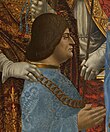
Ludovico Sforza
- February – Robert Lauder of the Bass, governor of Berwick-on-Tweed (b. c. 1440)
- February 4 – Conrad Celtes, German humanist (b. 1459)
- February 15 – Giovanni II Bentivoglio, tyrant of Bologna (b. 1443)
- February 27 – James, Duke of Rothesay, heir to the throne of Scotland (b. 1507)
- February 28 – Philip, Elector Palatine (b. 1448)
- March 18 – Albert IV, Duke of Bavaria (b. 1447)
- March – Lourenço de Almeida, Portuguese explorer
- April 10 – Guidobaldo da Montefeltro, Italian condottiero (b. 1472)
- May 21 – Giles Daubeney, 1st Baron Daubeney (b. 1451)
- May 27 – Ludovico Sforza, Duke of Milan (b. 1452)
- June 6 – Ercole Strozzi, Italian poet (b. 1473)
- June 15 – Bernard Stewart, 4th Lord of Aubigny (b. c. 1452)
- July 28 – Robert Blackadder, Bishop of Glasgow
- July 31 – Na’od, Emperor of Ethiopia (in battle)
- September 23 – Beatrice of Naples, queen consort of Hungary (b. 1457)
- October 18 – Patrick Hepburn, 1st Earl of Bothwell, Lord High Admiral of Scotland
- October 10 – János Thurzó, Hungarian businessman (b. 1437)
- October 23 – Edmund de Ros, 10th Baron de Ros, English politician (b. 1446)
- November 25 – Ursula of Brandenburg, Duchess of Münsterberg-Oels and Countess of Glatz (b. 1450)
- December 10 – René II, Duke of Lorraine (b. 1451)
- December 16 – Henry the Younger of Stolberg, Stadtholder of Friesland (1506–1508) (b. 1467)
- December 22 – Eric II, Duke of Mecklenburg (b. 1483)
- date unknown
- Isaac Abravanel, Portuguese statesman, philosopher and theologian (b. 1437)
- Mahmud Khan (Moghul Khan), Khan of Tashkent
- Micheletto Corella, Valencian condottieri
- Damkhat Reachea, emperor of Cambodia
- Ahmad al-Wansharisi, North African Islamic jurist and theologian
1509
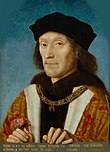
Henry VII of England

Joao da Nova
- January – Adam Kraft, sculptor and architect
- January 27 – John I, Count Palatine of Simmern (1480–1509) (b. 1459)
- March 14 – Giovanni Antonio Sangiorgio, Italian cardinal
- April 21 – King Henry VII of England (b. 1457)
- April 27 – Margaret of Brandenburg, abbess of the Poor Clares monastery at Hof (b. 1453)
- May 28 – Caterina Sforza, countess and regent of Forli (b. 1463)
- June 29 – Margaret Beaufort, Countess of Richmond and Derby, mother of Henry VII of England (b. 1443)
- July 11 – William II, Landgrave of Hesse (b. 1469)
- July 16
- Joao da Nova, Portuguese explorer (b. 1460)
- Mikalojus Radvila the Old, Lithuanian nobleman (b. c. 1450)
- July 28 – Ignatius Noah of Lebanon, Syriac Orthodox patriarch of Antioch (b. 1451).[65]
- December 1 – Lê Uy Mục, 8th king of the later Lê Dynasty of Vietnam (b. 1488)
- date unknown
- Hans Seyffer, German sculptor and woodcarver (b. c. 1460)
- Shen Zhou, Chinese painter (b. 1427)
- Eleanor de Poitiers, Burgundian courter and writer
- Viranarasimha Raya, ruler of the Vijayanagar Empire
